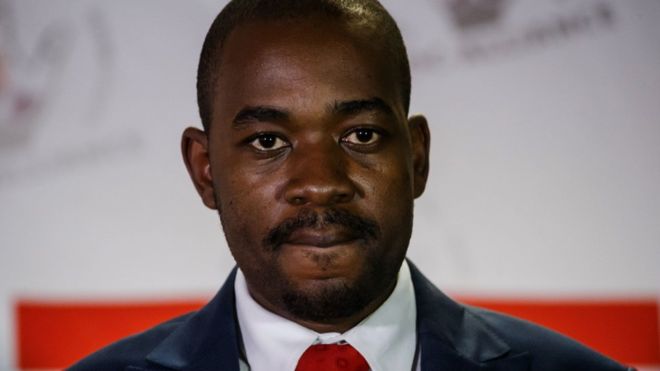Former leader of the Citizens Coalition for Change (CCC), Nelson Chamisa, has once again called on SADC to address Zimbabwe’s governance crisis, asserting that the country cannot plan for the 2028 polls while the 2023 election result is still contested.
Chamisa claims he has devised a way forward, sharing the roadmap with all key stakeholders, and plans to reveal this proposed roadmap in due course.
“We have engaged different stakeholders within the SADC region, even at the Heads of State level. I have sent delegations to various capitals in the region and the continent to brief esteemed leaders about the election dispute in Zimbabwe, the political stalemate, and our proposed way forward,” Chamisa said at a press conference held on Monday in Harare.
“We are acutely aware of the urgency of this matter. There can be no talk of 2028 or a viable and stable future for this country without resolving the August 2023 issues,” he added.
Chamisa stated he would not consider political participation in 2028 until the 2023 issue was settled. “Let’s fix 2023 and not wait for 2028,” he said.
Chamisa, who received over two million votes in the 2023 presidential election, said he was ready to seek a resolution as a national leader, avoiding partisan politics.
“That mandate cannot be abdicated, abandoned, or squandered. On September 26, 2023, we wrote to our regional body, SADC, the guarantor of the values and principles of the aspirations of the ‘common agenda’ and ‘common will’ of the people of Southern Africa,” Chamisa said, adding that he wrote again to SADC on October 23, 2023.
“SADC responded to our request and advised that they were giving the matter due consideration through relevant organs. We have noted the various meetings the leadership of SADC has held, including the latest Extraordinary Summit of the Organ Troika on March 23, 2024, in Lusaka, Zambia.”
Chamisa said they had been patiently waiting for a response from SADC. “On April 29, however, since considerable time had elapsed, I wrote again to SADC. We delivered our follow-up to SADC and await a response to determine a clear path forward to resolve the governance crisis and leadership dispute in the country,” he said, noting that Zimbabwean citizens were “very clear and firm” that the elections were improperly conducted, indeterminate, and produced a manipulated outcome.
“This position is supported and confirmed by SADC, the African Union, the European Union, the Commonwealth, COMESA, Carter Center, and all other intergovernmental organizations which deployed election observer missions to Zimbabwe,” Chamisa said.
Chamisa noted that no other election in Zimbabwe’s history has invited such ‘universal’ condemnation as the August 2023 elections.
“This matter must be resolved so that the country can have proper elections that produce a proper government from the citizens,” he said, calling on SADC and the AU to act, given their condemnation of the 2023 election process.
“Condoning the current government is clearly untenable. We don’t expect them to ultimately endorse a sham and a fraud. It would be a contradiction in terms to determine a process as flawed and yet condone its outcome.”
Chamisa asserted that writing to SADC was not a sign of desperation or a lack of ideas but a “deliberate effort and a desire to exhaust the available remedies and peaceful means to resolve national issues.”
“It is our strict commitment to finding each other and amicably resolving our points of conflict, disjuncture, and disagreement. We have committed to a peaceful resolution of disputes and intend to exhaust all available peaceful remedies,” Chamisa said.
“As you are all aware, millions of you agree with this approach. Zimbabwe is too beautiful and precious to be destroyed by flames of political disputes under our watch. I don’t want to be the author of the demise of this nation. Peace is fragile. Peace is sacrosanct. And the breakdown of peace knows no winner. The opposite of peace leaves us all losers. Our beautiful country can never progress on the back of disunity, division, and successive disputed national processes, including contested elections.”
Chamisa said he had made numerous efforts to engage with other presidential contenders, including Zanu PF leader President Emmerson Mnangagwa, who is aware of their point of dispute.
“I can tell you it is a disputed election, which is the center, basis, and foundation of our problems,” Chamisa said, adding that this was a point he made to regional bodies, highlighting that Zimbabwe had a “de facto government, a parliament that was also not de jure, including the local authorities.”
Chamisa claimed he was “doing everything necessary, to the extent of God’s will, to seek a lasting solution to the perennial challenges” affecting Zimbabwe.
“Locally and nationally, I have engaged all the stakeholders, including the traditional leadership, business community, civil society at large, political parties, and members of the diplomatic corps,” he said.
In particular, Chamisa mentioned seeking the mediatory role of church leadership to help resolve the disputed elections and contested national processes, albeit with limited progress.

